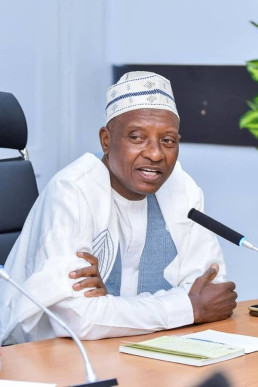- 5965
- 0
Sharing Ideas and Updates on LPG in Nigeria and related information to enable effective collaboration within the LPG Value Chain
National Gas Expansion Plan - LPG Autogas initiative.

On the 31st of October, 2023, Nigeria celebrated a significant milestone as the Lagos Chamber of Commerce and Industry marked its 135th Anniversary with the Autogas Opportunity Fair Program. The event featured a keynote speech by Dr. Mohammed M. Ibrahim, Chairman of the National Gas Expansion Program (NGEP). Dr. Ibrahim's address not only illuminated Autogas as a solution to Nigeria's fuel challenges but also emphasized the urgent need for a comprehensive review of the Petroleum Industry Act (PIA) of 2021. Let’s delve into the vital points from Dr. Ibrahim's speech and explore the implications of this call for reform.
The Current Energy Landscape:
Dr. Mohammed Ibrahim's address commenced by highlighting the pressing need for cleaner and more sustainable energy solutions in Nigeria. He emphasized the dwindling gas production in the country and the critical importance of making Liquefied Natural Gas (LNG) and Liquefied Petroleum Gas (LPG) more accessible. With over 300 LNG stations in Nigeria, there is a significant potential for transforming the energy sector.
Challenging the CNG Fixation:
Dr. Ibrahim urged Nigerians to look beyond their fixation on Compressed Natural Gas (CNG) and consider the broader spectrum of Autogas. He pointed out a significant challenge with the CNG policy – there are fewer than 20 stations nationwide. Dr. Ibrahim advocated for Autogas (Auto LPG), stressing that it is affordable, available, and cost-effective. Comparing it to CNG, he highlighted that Autogas is far less complex and can provide a sustainable solution to the nation's fuel problem.
Expanding Opportunities:
The NGEP Chairman also emphasized the vast potential for Autogas LPG. With over 9,000 retail fuel stations that qualify for Autogas dispensing, this initiative could create job opportunities for up to half a million technicians. Furthermore, it could enable Nigerians to manufacture conversion kits, offering new economic prospects.
Multi-Fuel System:
Dr. Ibrahim introduced the concept of a multi-fuel system, encompassing Auto LNG, Auto CNG, Auto Gas (LPG), petrol, and kerosene. To facilitate this shift, NGEP has undertaken several efforts. They have reviewed regulations, provided fiscal incentives, and worked on domestication through reverse engineering and conversion kits.
NGEP's Autogas Scheme:
The NGEP's Autogas Scheme has been making significant strides in Nigeria. In 2020, it initiated the full implementation of Autogas retail outlets, and in 2021, it aimed to promote the co-location of Autogas outlets and support the deployment of conversion kits for trucks and smaller vehicles. This initiative is set to lower transportation costs, enhance the operating efficiency of vehicles, and create over 9,000 licensed retail outlets.
NGEP's Impact:
The NGEP's Autogas Scheme holds the potential for transformative economic impact. It could generate millions of direct and indirect jobs, lead to economic growth and development, and transfer technology for Autogas conversion. The scheme could create jobs, build capacity, and promote the growth of the gas supply chain in Nigeria.
The Call for PIA Review:
Dr. Mohammed M. Ibrahim's speech also included a critical call for President Bola Ahmed Tinubu to review the Petroleum Industry Act (PIA) of 2021. He warned that without this crucial step, Nigeria could end up importing natural gas, similar to the country's current reliance on imported cooking gas. He expressed his dismay over the PIA 2021, stating that its implementation, at best, has been tepid and is unlikely to deliver what the country needs.
Focusing on Value Addition:
The NGEP's vision is to add value to Nigeria's abundant natural gas reserves rather than exporting them in their raw form. Dr. Ibrahim emphasized that Nigeria should focus on utilization and transformation of its natural gas resources within the country's borders, which is a good way to reinforce LPG production in the country. This approach aims to create a diverse range of products, including petrochemicals, paints, insecticides, pesticides, and fertilizers, thereby contributing to economic growth and sustainability.
Conclusion:
Dr. Mohammed M. Ibrahim's passionate address at the Autogas Opportunity Fair underscores the urgency of gas sector reform in Nigeria. The call for President Tinubu to review the Petroleum Industry Act (PIA) of 2021 reflects the imperative of aligning policies with the country's best interests. The NGEP's commitment to adding value to Nigeria's gas resources is a visionary approach, emphasizing the importance of utilization and transformation within the nation's borders. As Nigeria navigates its energy transition, the role of natural and liquefied gas, when appropriately harnessed, promises to drive economic growth, job creation, and energy security. It is an opportune moment for Nigeria to make the most of its gas wealth, ensuring a brighter and more sustainable energy future.
As usual, we will love to hear from you. Please comment below.
You can also explore our marketplace to support LPG-verified suppliers.
















0 Comment.